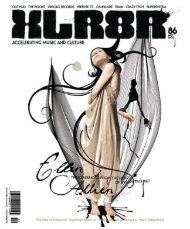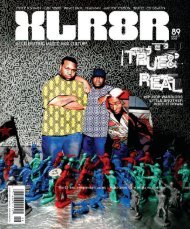Create successful ePaper yourself
Turn your PDF publications into a flip-book with our unique Google optimized e-Paper software.
comp<br />
reviews<br />
Acid: Can You Jack<br />
Soul Jazz/UK/CD<br />
Larry Heard<br />
Two new comps<br />
further define acid<br />
house’s legacy.<br />
With the ashes of the “disco sucks” record burning in Chi-<br />
Town’s Comisky Park, lovers of dance music went underground,<br />
where their only respite from the racist reaction was<br />
all-night house parties. They were down but not out; as Tim<br />
Lawrence (writer of disco history book Love Saves The Day)<br />
explains in the liner notes for Acid: Can You Jack, house<br />
music was “disco’s revenge.” Like the Knights Templar or the<br />
Freemasons, the banned disco culture sublimated the scene<br />
under the guise of building a house. Brick by brick the genre<br />
introduced the Roland 808 drum machine, replaced lush<br />
string arrangements with staccato synths, and even snuck in<br />
some maligned divas.<br />
But if house music was about renovation, then acid house<br />
was about tearing the shit down and starting all over. The<br />
new wave of Chicago producers made music from their<br />
bedroom–no room for musicians, only plastic boxes like the<br />
Roland TB303. Tweaked knobs made blips and squelches<br />
that would repulse the likes of Thelma Houston. The sounds<br />
made were more familiar to computer printers and automated<br />
production lines; fitting, considering the industrial city that<br />
Chicago was and its proximity to Motor City, where they<br />
already Metropolized (updated) Motown and the motorbooty.<br />
In fact, acid house is almost as much Detroit techno as it<br />
is Chicago house. Players like Phuture (DJ Pierre and Spanky)<br />
and Marshall Jefferson (a.k.a. Sleazy D) weren’t interested<br />
in updating the “The Sound of Philadelphia” as much as they<br />
wanted to make a brand new sound–witness tracks like<br />
Atom presents ACID<br />
(Evolution 1988-2003)<br />
Logistic/FRA/CD<br />
“Phuture Jacks” and “I’ve Lost Control,” just a few of the<br />
classics included in the two-disc set.<br />
Acid: Can You Jack resembles a playlist from the Music<br />
Box, Ron Hardy’s legendary club. It features classic tunes that<br />
mostly appeared on the Trax or DJ International labels, with<br />
the addition of modern concoctions like, “Acid Bass” by Roy<br />
Davis JNR. or “Explorer” by Green Velvet/Cajmere.<br />
A few years later, avant garde artists like Genesis P-<br />
Orridge–thinking “acid” referred to LSD–combined the jack<br />
with the Union Jack and some ‘60s psychedelia to put the<br />
movement in a whole new context. Psychic TV’s Jack The Tab<br />
(1988) was put out by Temple, “the original home of UK acid<br />
house,” and their 12-inch, “Tune In (Turn On Thee Acid House)”<br />
introduced a more cosmic and industrial side of acid. That’s<br />
where Atom Heart’s Acid: Evolution 1988-2003 comes in.<br />
If the Soul Jazz collection centers on the American<br />
output from 1985 on, then Logistic Records capitalizes on<br />
Pink Floyd-inspired European movements. Under a variety of<br />
aliases, Uwe Schmidt (Atom Heart) has taken European acid<br />
from graffiti to fractals to a sound that borders on trance.<br />
In fact, Atom’s “Little Grey Box” is a sturdy bridge between<br />
Chicago house and Frankfurt’s Harthouse sound, and Fume’s<br />
“Jack2000” is a display of where acid was going in the new<br />
millennium. Atom’s collection follows what happened when<br />
acid left its home, in a culture that feared ambisexuality, for<br />
a continent that almost preferred it. Daniel Siwek<br />
91











